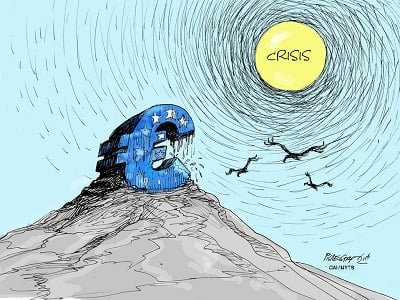
Did you know that Truthout is a nonprofit and independently funded by readers like you? If you value what we do, please support our work with a donation.
I’ve been talking to some people I respect about the fate of the euro, and it seems to me that the key issue here involves the balance of risks.
Think of it as Scylla and Charybdis.
On one side, there is the risk of seeing European economies dashed against the rocks of debt crisis; on the other, the danger of seeing Europe pulled down into a vortex of deflation.
For the past four years European policy has been dominated by a completely one-sided assessment of these risks: imminent debt disaster, and nothing to worry about from austerity – the Confidence Fairy will take care of it.
There is a more sober, serious position that considers the shoals of debt to be a serious risk, and the vortex of deflation not yet too threatening.
As you might guess, I have a different view altogether. Now that the European Central Bank is willing to do its job as lender of last resort, the debt threat is much less pressing than previously portrayed – and I have been arguing all along that for non-euro countries it’s not a threat at all.
Meanwhile, I’m terrified about that vortex of deflation. Europe may still be circling the drain fairly slowly, but inflation expectations have become unmoored, actual inflation is falling and the recovery, such as it was, has stalled. By the time the downward spiral becomes undeniable it may well be irreversible.
Could I be wrong?
Of course. But economic policy always involves balancing risks, and I think we should be much more afraid of a European depression than we are of a fiscal crisis.
Austerity and the Hapless Left
In a recent column, I was not nice to French President François Hollande, who has shown about as much strength in standing up to austerians as a wet Kleenex. But one does have to admit that he’s not alone in his haplessness. Where are the major political figures on the European left who are taking a stand against disastrous policies? Britain’s Labour Party has been almost surreally unwilling to challenge the core premises of Prime Minister David Cameron’s policies. Is anyone doing better?
You can complain – and I often have – about President Obama’s willingness to go along with belt-tightening rhetoric, about the years he wasted in pursuit of a Grand Bargain on the budget, and so on. Still, the Obama administration, while it won’t use the word “stimulus,” favors the thing itself, and in general American liberals have taken a much more forthright stand against hard-money, balanced-budget orthodoxy than their counterparts in Europe.
Economists, in particular, have taken a much stronger stand. In Britain there are, to be sure, some prominent anti-austerity voices – the economists Martin Wolf, Jonathan Portes, Simon Wren-Lewis and others who I’m sure I’m missing. But they don’t seem to have anything like the weight in the debate that Larry Summers, Alan Blinder and many others have here.
Why the difference?
I don’t really know. I have a couple of hypotheses. One is that intellectual ecology in the United States seems much more flexible: Here, serious economists with celebrated research credentials can also be public intellectuals with large followings, and even serve as public officials; and they can provide at least some counterweight to the Very Serious People. Think Mr. Summers, the former Treasury secretary, but also Federal Reserve Chairwoman Janet Yellen (and before her Ben Bernanke), and in a somewhat different way yours truly.
Such people aren’t totally absent in Europe – Mervyn King, the former governor of the Bank of England, was an academic central banker, and so in a way is Mario Draghi, the president of the E.C.B. But there’s a lot more of them in the United States.
Another hypothesis is that American liberals have been toughened up by the craziness of the right, and in particular by the experience of the Bush years. After seeing the Very Serious People lionize President George W. Bush, a fundamentally ludicrous figure, and cheer on a war that was obviously cooked up on false pretenses, American liberals are more ready than European Social Democrats to believe that the men in good suits have no idea what they’re talking about. Oh, and America does have a network of progressive think tanks that is vastly bigger and more effective than anything in Europe.
But I’m just making suggestions here.
The haplessness of the European left is still something I don’t fully understand.
Media that fights fascism
Truthout is funded almost entirely by readers — that’s why we can speak truth to power and cut against the mainstream narrative. But independent journalists at Truthout face mounting political repression under Trump.
We rely on your support to survive McCarthyist censorship. Please make a tax-deductible one-time or monthly donation.